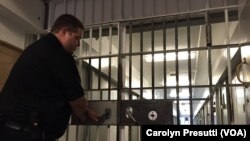The U.S. Justice Department says it will start providing an individualized life skills and job training program for the more than 40,000 convicts being released each year from federal prisons in hope of smoothing their re-entry into society.
Attorney General Loretta Lynch is announcing the plan as part of the U.S. effort to overhaul a two-decade-old sentencing law that led to mass incarceration of many offenders and now is widely viewed as discriminatory against blacks and other minorities.
Numerous government officials and lawmakers are calling for more lenient sentences and treatment of non-violent offenders at halfway houses and in other government programs, rather than putting them behind bars.
The personalized plan for exiting prisoners would include an educational road map and job training, along with substance abuse and mental health treatment.
Lynch urged the country's governors to make it easier for convicted felons leaving prison to get state-issued identification cards to ease their transition into life outside prison walls, saying it would help them obtain a driver's license.
"The long-term impact of a criminal record prevents many people from obtaining employment, housing, higher education and credit," Lynch said, "and these barriers affect returning individuals, even if they have turned their lives around and are unlikely to reoffend."
At the White House, experts analyzed the effects of mass incarceration in the United States.
Todd Cox of the Center for American Progress, a liberal think tank, said that a third of Americans have some sort of criminal record and that half of U.S. children have at least one parent who has been convicted.
Other officials called for revision of the 1994 law that led to the mass incarceration in the United States. Democratic and Republican lawmakers have called for revisions, but disagreements remain in Congress on how to shape the changes.




